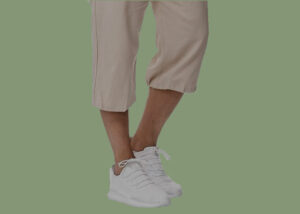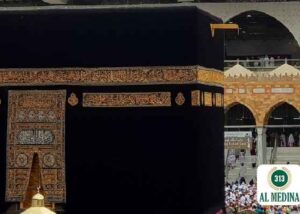Is it Haram to allow trousers to extend beyond the ankles?
Quran
Hadith
Islamic Text
It is Haram to allow trousers to extend beyond the ankles if it is done out of arrogance. If it is not done out of arrogance then it is not sinful, as has been established in numerous Sahih Hadith. However, the Sunnah for men is to wear garments to mid-shin.
أَنَّ ابْنَ عُمَرَ، حَدَّثَهُ أَنَّ النَّبِيَّ صَلَّى اللهُ عَلَيْهِ وَسَلَّمَ، قَالَ: «بَيْنَمَا رَجُلٌ يَجُرُّ إِزَارَهُ مِنَ الخُيَلاَءِ، خُسِفَ بِهِ، فَهُوَ يَتَجَلْجَلُ فِي الأَرْضِ إِلَى يَوْمِ القِيَامَةِ» تَابَعَهُ عَبْدُ الرَّحْمَنِ بْنُ خَالِدٍ، عَنِ الزُّهْرِيِّ
(Abdullah) Ibn Umar (May Allah Most High be pleased with them both) said, The Prophet ﷺ said, ‘While a man was dragging his Izaar (lower garment) out of arrogance, he was caused to be swallowed by the earth and will go on sinking in the earth until the Day of Resurrection.’ (Sahih al-Bukhari, 3485).
In the Hadith narration above the Prophet ﷺ made it clear that the garment extending beyond the ankle is a concern if it is done out of arrogance. It is correct to say that some of the Hadith narrations do not mention arrogance (see Sahih al-Bukhari 5790). However, the scholars of Islam agree that one must not take verses of Quran or Hadith of the Prophet ﷺ in isolation when speaking about the Deen, rather one must gather all related evidence before reaching a conclusion. When this is done regarding the issue of extending garments beyond the ankles then it becomes clear that the prohibition is related to arrogance.
The Hadith above has been narrated numerous times in Bukhari and Muslim with the specification of arrogance (see Bukhari 5789, Muslim 2088 – 49 and 2088 – 50). So when we find narrations without such a stipulation then they must be considered alongside those that have the stipulation of arrogance. Imam al-Bukhari himself indicated this in his chapter heading in his Sahih:
بَابُ مَنْ جَرَّ إِزَارَهُ مِنْ غَيْرِ خُيَلاَءَ
Chapter: The one who drags his lower garment without arrogance. (Sahih al-Bukhari).
As well as the clear evidence provided above. There is an abundance of other narrations proving that extending garments beyond ankles is only prohibited if it is accompanied by arrogance.
عَنْ أَبِي هُرَيْرَةَ، أَنَّ رَسُولَ اللَّهِ صَلَّى اللهُ عَلَيْهِ وَسَلَّمَ قَالَ: لاَ يَنْظُرُ اللَّهُ يَوْمَ القِيَامَةِ إِلَى مَنْ جَرَّ إِزَارَهُ بَطَرًا
Abu Huraira (May Allah Most High be pleased with him) said that Allah’s Messenger ﷺ said, ‘On the Day of Resurrection Allah (Most High) will not look at a person who drags his Izaar (lower garment) out of arrogance.’ (Sahih al-Bukhari, 5788).
This and other similar Hadith are also narrated by Imam Muslim multiple times (see 2087 – 48, 2085 – 43, 2085 – 45, 2085 – 46). Once again these narrations clarify that arrogance is a requisite for the prohibition to be established. The narration in Muslim numbered 2085 – 46, has a clear example of the early Muslims understanding this point.
We even find practical examples of this issue in the Sunnah. Examples where either the Prophet ﷺ or a Sahabi has garments extend beyond the ankles, but it is not prohibited due to the absence of arrogance.
عَنْ أَبِي بَكْرَةَ، قَالَ: خَسَفَتِ الشَّمْسُ عَلَى عَهْدِ رَسُولِ اللَّهِ صَلَّى اللهُ عَلَيْهِ وَسَلَّمَ فَخَرَجَ يَجُرُّ رِدَاءَهُ، حَتَّى انْتَهَى إِلَى المَسْجِدِ وَثَابَ النَّاسُ إِلَيْهِ، فَصَلَّى بِهِمْ رَكْعَتَيْنِ، فَانْجَلَتِ الشَّمْسُ، فَقَالَ: «إِنَّ الشَّمْسَ وَالقَمَرَ آيَتَانِ مِنْ آيَاتِ اللَّهِ، وَإِنَّهُمَا لاَ يَخْسِفَانِ لِمَوْتِ أَحَدٍ، وَإِذَا كَانَ ذَاكَ فَصَلُّوا وَادْعُوا حَتَّى يُكْشَفَ مَا بِكُمْ» وَذَاكَ أَنَّ ابْنًا لِلنَّبِيِّ صَلَّى اللهُ عَلَيْهِ وَسَلَّمَ مَاتَ يُقَالُ لَهُ إِبْرَاهِيمُ فَقَالَ النَّاسُ فِي ذَاكَ
Abu Bakrah (May Allah Most High be pleased with him) said, in the lifetime of Allah’s Messenger ﷺ the Sun eclipsed. He ﷺ went out dragging his garment until he ﷺ reached the Masjid. The people gathered around him and he ﷺ led them in a two rak’a prayer. When the Sun (eclipse) cleared, he ﷺ said, ‘The Sun and the Moon are two signs from the signs of Allah (Most High), they do not eclipse due to the death of any person. So when it (an eclipse) occurs, then pray and supplicate until the issue (eclipse) is over.’ This occurred when a son of the Prophet ﷺ called Ibrahim passed away (on that day), so people were talking about that (saying that the eclipse was caused by his passing away). (Sahih al-Bukhari, 1063).
The Hadith above is narrated in Bukhari and Muslim repeatedly (see Bukhari 1040, 5785, Muslim 574 – 101). The narration is explicit regarding the fact that the garment of the Prophet ﷺ was beyond the ankles, rather it was on the ground. Some people dismiss this as evidence saying it was in a situation where the Prophet ﷺ was in a hurry, and therefore not valid to consider. This objection is easily overcome, it requires a little reflection. If it is prohibited to allow garments to extend beyond the ankles, then would it be permitted to do it if one were in a rush. Which prohibitions in Islam drop because one is in a rush? Especially when considering the Prophet ﷺ was rushing to a Sunnah prayer, not to an emergency.
Rather the Hadith is proof that arrogance is a requisite for the ruling of prohibition. Although this Hadith would suffice to prove this point, it is worth noting that there are other examples of this occurring. Where the Prophet ﷺ himself or a Sahabi allowed garments to extend beyond the ankles due to hurrying. (See Sahih Muslim 574 – 101 and 343 – 80).
In the narration below we find the Prophet ﷺ putting Abu Bakr (May Allah Most High be pleased with him) at ease and explaining that he does not allow his garments to extend out of arrogance, therefore it is excused. This evidence is incredibly clear regarding the issue at hand. Had it been prohibited the Prophet ﷺ would have commanded him to take greater care.
عَنْ عَبْدِ اللَّهِ بْنِ عُمَرَ رَضِيَ اللَّهُ عَنْهُمَا، قَالَ: قَالَ رَسُولُ اللَّهِ صَلَّى اللهُ عَلَيْهِ وَسَلَّمَ: «مَنْ جَرَّ ثَوْبَهُ خُيَلاَءَ، لَمْ يَنْظُرِ اللَّهُ إِلَيْهِ يَوْمَ القِيَامَةِ» فَقَالَ أَبُو بَكْرٍ: إِنَّ أَحَدَ شِقَّيْ ثَوْبِي يَسْتَرْخِي، إِلَّا أَنْ أَتَعَاهَدَ ذَلِكَ مِنْهُ؟ فَقَالَ رَسُولُ اللَّهِ صَلَّى اللهُ عَلَيْهِ وَسَلَّمَ: إِنَّكَ لَسْتَ تَصْنَعُ ذَلِكَ خُيَلاَءَ
Abdullah bin Umar (May Allah Most High be pleased with them both) said, that Allah’s Messenger ﷺ said, ‘On the Day of Judgment, Allah (Most High) will not look at a person who drags his robe (behind him) out of arrogance.’ Abu Bakr (May Allah Most High be pleased with him) said, ‘One side of my robe slides down if I do not pay attention to it.’ So Allah’s Messenger ﷺ said, ‘You do not do that out of pride.’ (Sahih al-Bukhari, 3665).
Had it been absolutely prohibited to allow the garment to descend below the ankle then the Prophet ﷺ would not have been so lenient. The fact the Prophet ﷺ was so lenient makes it clear that it is not absolutely prohibited. Rather only prohibited if done out of arrogance. Due to the abundance of evidence proving that the prohibition relates to arrogance, many scholars stated this in their works.
هَذَا بَاب فِي بَيَان حكم من جر إزَاره من غير قصد التخييل، فَإِنَّهُ لَا بَأْس بِهِ من غير كَرَاهَة. (عمدة القاري شرح صحيح البخاري)
This chapter (in Sahih al-Bukhari) clarifies the ruling of dragging the garment without intending arrogance. Indeed there is no harm in it and it is not Makruh. (Imam Badr al-Deen al-Ayni, Umdatu al-Qari Sharh Sahih al-Bukhari).
إسْبَالُ الرَّجُلِ إزَارَهُ أَسْفَلَ مِنْ الْكَعْبَيْنِ إنْ لَمْ يَكُنْ لِلْخُيَلَاءِ فَفِيهِ كَرَاهَةُ تَنْزِيهٍ. (الفتاوى الهندية)
A man extending his garment below the ankles is Makruh Tanzeehi (slightly disliked) if it is not done out of arrogance. (al-Fatawaa al-Hindiyah).
In the above Nusoos (texts) we see that major scholars clarified that the prohibition applies to arrogance. If one allows the garments to extend without arrogance then it is not prohibited. However, some scholars did say it is Makruh to do even if arrogance is not present, since the Sunnah is to extend the garment to mid-shin (see link below for more details). Others did not consider it to be Makruh.
With such an abundance of available evidence, it is surprising that people who claim to focus on evidence found in Quran and Sunnah seem to ignore so many authentic Hadith. Rather they insist that there is an absolute prohibition on allowing garments to extend beyond the ankles.
And Allah (Most High) Knows Best.
– Answered by Shaykh Noorud-deen Rashid (18.01.2022)
See also:
Is it Sunnah to wear trousers to the middle of the shin?
See also (video):






